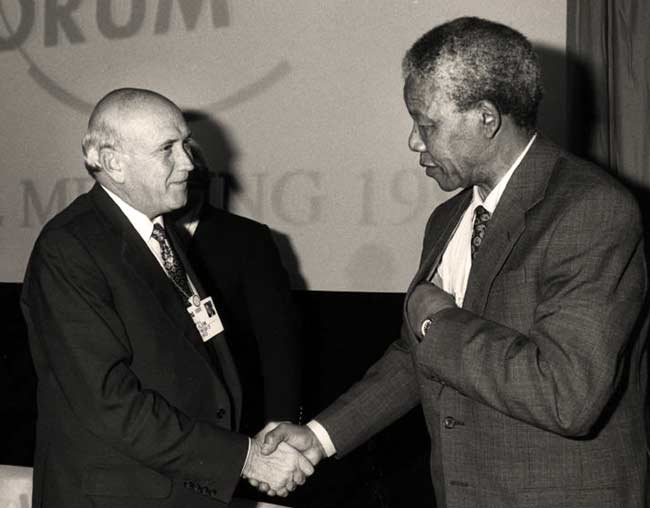World Economic Forum / Wikimedia Commons / CC-BY-SA-3.0 / GFDL
1 – Nelson Mandela Released From Prison After 27 Years
Mandela was a South African anti-apartheid revolutionary, who served as President of South Africa from 1994 to 1999 after being imprisoned for 27 years.
Mandela worked as a lawyer in Johannesburg before becoming involved in politics and joining the ANC in 1943. He came to prominence during the 1952 Defiance Campaign and the 1955 Congress of the People.
In 1962, Mandela was arrested and sentenced to life imprisonment for conspiring to overthrow the state.
He spent the first 18 of his 27 years as a prisoner on Robben Island, situated in Table Bay off the coast of Cape Town.
Confined to a small cell without a bed or plumbing, Mandela was forced to do hard labor in a quarry. Once every 6 months, he could write and receive a letter and was allowed to meet with a visitor for 30 minutes once a year.
On 11 February 1990, amid growing international pressure and fears of racial civil war, President F.W. de Klerk released Mandela from Victor Verster Prison. The two men then led efforts to bring an end to apartheid.
In 1993, Mandela and President F.W. de Klerk were jointly awarded the Nobel Peace Prize for their efforts to dismantle the country’s apartheid system.
Mandela led the ANC to victory in 1994, becoming the country’s first black head of state and the first elected in a fully representative democratic election.
In November 2009, the UN General Assembly proclaimed Mandela’s birthday, 18 July, as “Mandela Day.”
After suffering from a prolonged respiratory infection, Mandela died in 2013 at the age of 95.
2 – First Gulf War Begins
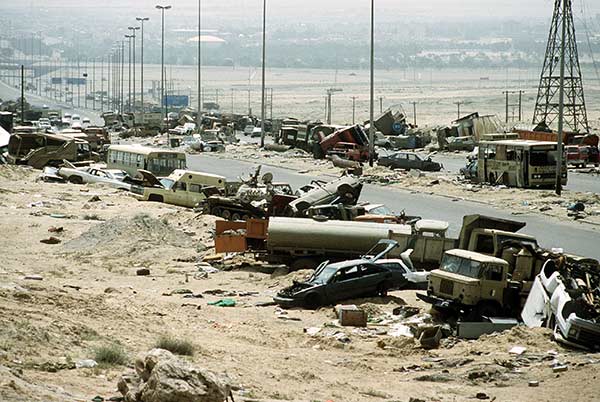
The first Gulf War was a war waged by the United States and coalition forces from 35 nations against Iraq. The war was a response to Iraq’s invasion and annexation of Kuwait arising from oil-related disputes.
The operations involving the buildup of troops and defense of Saudi Arabia was codenamed Operation Desert Shield, while the combat phase was codenamed Operation Desert Storm.
On 2 August 1990, the Iraqi Army invaded Kuwait, resulting in condemnation from the international community and immediate economic sanctions against Iraq by members of the UN Security Council.
The coalition of 35 countries was the largest military alliance since World War II. The vast majority of the coalition’s military personnel were from the United States, followed by Saudi Arabia, the United Kingdom, and Egypt.
It was the first war to have live news broadcasts from the front lines, earning the nickname “Video Game War” due to the daily broadcast of images from cameras onboard US bombers during Operation Desert Storm.
The campaign to expel Iraqi troops from Kuwait began on 17 January 1991 with an aerial bombardment, followed up by a ground assault on 24 February. Coalition forces struck a decisive victory and advanced into Iraqi territory after liberating Kuwait.
Only 100 hours after the ground campaign started, coalition forces ceased their advance and declared a ceasefire.
Combat had been confined to Iraq, Kuwait, and along the Saudi Arabian border, while Iraq launched Scud missiles against military targets in Saudi Arabia and against Israel.
3 – Mary Robinson Elected as First Female President of Ireland
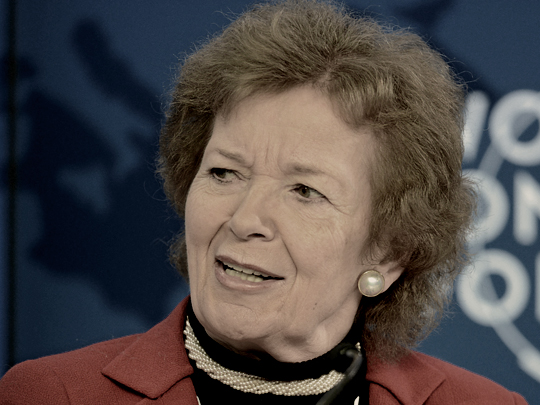
Robinson made history when she was inaugurated as the seventh President of Ireland on 3 December 1990, becoming the first woman to hold this office.
She was the first elected President in the office’s history not to have had the support of Fianna Fáil, going on to serve until 1997.
Robinson first rose to prominence as a barrister and campaigner, serving as a Senator from 1969 to 1989.
In the 1990 presidential election, as an Independent candidate, she was nominated by the Labour Party, the Workers’ Party and Independent Senators.
Widely regarded as a transformative figure for the Irish presidency, Robinson revitalized a previously conservative and low-profile political office.
After her presidency, Robinson served as the United Nations High Commissioner for Human Rights from 1997 to 2002.
She has established The Mary Robinson Foundation-Climate Justice, which encourages thought leadership, education, and advocacy for those affected by climate change without a voice, the poor, the disempowered and marginalized.
Robinson is a founding member and chairman of the Council of Women World Leaders.
In 2004, she received Amnesty International’s Ambassador of Conscience Award for her work in promoting human rights.
4 – Black January – Soviet Crackdown on Azerbaijani Independence Demonstrations

Black January was a violent crackdown on the civilian population of Baku, Azerbaijan, on 19–20 January 1990, following the declaration of a state of emergency during the dissolution of the Soviet Union.
Soviet General Secretary Mikhail Gorbachev and Defence Minister Dmitry Yazov deemed military law necessary to thwart efforts by the Azerbaijani independence movement to overthrow the Soviet Azerbaijani government.
Late on 19 January, Soviet special forces terminated phone and radio lines and the central television station, before 26,000 Soviet troops entered Baku in order to crush the Popular Front uprising.
Up to 300 Azerbaijani civilians were killed, with a further 800 people injured.
During the Black January crackdown, Soviet authorities were able to suppress any efforts to disseminate news from Azerbaijan to the local population and the international community.
Black January is seen as the rebirth of the Azerbaijan Republic, prior to proclaiming its independence on 30 August 1991.
In 1995, Gorbachev apologized to Azerbaijan and said declaring the state of emergency in Baku was the biggest mistake of his political career.
5 – Panamanian Leader Gen Manuel Noriega Surrenders to US Authorities
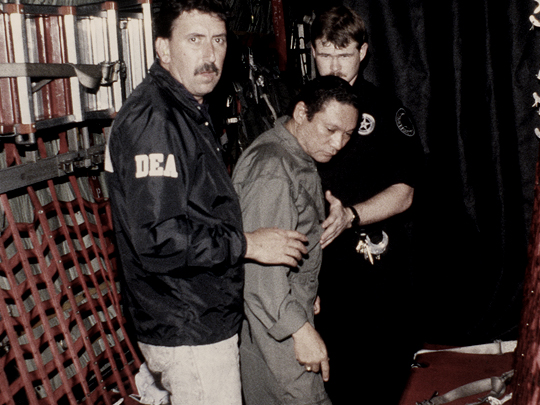
On 3 January 1990, Panama’s General Manuel Noriega, surrendered to U.S. military troops to face charges of drug trafficking, after holing up for 10 days at the Vatican embassy in Panama City.
In 1968, Noriega had become chief of military intelligence under the rule of Omar Torrijos, having risen through the army ranks.
After this, Noriega became a C.I.A. operative while also accruing considerable wealth from drug smuggling.
After Torrijos died in 1981 and Noriega went on to become the de facto leader of Panama from 1983 to 1989.
However, Noriega gradually lost U.S. support due to his drug trafficking activities in the midst of their war on drugs.
On 15 December 1989, Noriega declared the U.S. was in a state of war with Panama. The following day, an American marine was killed by Panamanian soldiers.
On 20 December, U.S. President Bush launched Operation Just Cause, invading Panama with a force of over 27,000 troops. Noriega was deposed, surrendering on 3 January 1990.
Noriega was flown to Miami the following day, while Panamanians celebrated on the streets of Panama City.
In 1992, Noriega was convicted of drug trafficking, money laundering, and racketeering and sentenced to 40 years in prison, of which he served 17 years.
In 2010, Noriega was extradited to France, where he was sentenced to seven years of imprisonment for money laundering.
In 2011 France extradited him to Panama, where he was incarcerated and died from cancer in 2017.
6 – Lech Walesa Sworn in as Poland’s First Popularly Elected President
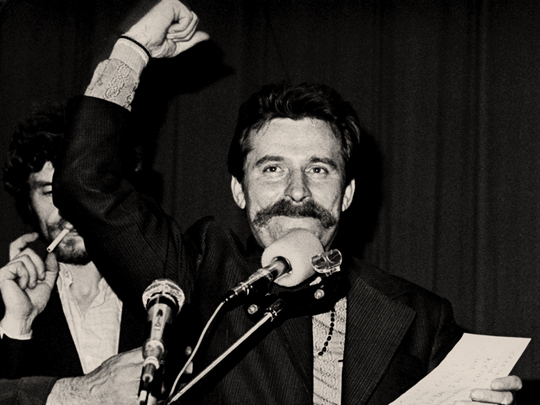
On 22 December 1990, Walesa, a renowned Polish labor leader, became the first noncommunist president of Poland since the end of World War II.
Walesa’s victory was a sign of the waning power of the Soviet Union.
While working as an electrician at the Lenin Shipyard (now Gdańsk Shipyard), Walesa became a trade-union activist.
In 1980 he played a key role in negotiations that led to the ground-breaking Gdańsk Agreement between striking workers and the government.
Walesa co-founded and led Solidarity, the Soviet bloc’s first independent trade union. In 1983, he won the Nobel Peace Prize.
In the Polish general election of 1990, Walesa successfully ran for the newly re-established office of President of Poland.
Walesa presided over Poland’s transition from communism to a post-communist state, but his popularity gradually waned and resulted in him narrowly losing the 1995 presidential election.
